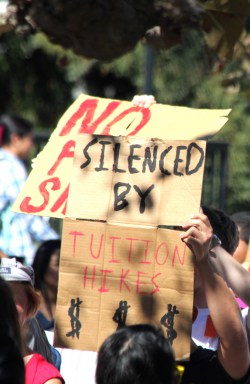
In 2018, MacLean’s listed the University of Regina and the University of Saskatchewan among the most expensive Canadian universities for students who leave their homes. In response, the U of R Students’ Union has called for a one-year provincial tuition freeze.
The URSU Tuition Freeze Now campaign has collected over 1,000 signatures on the online petition so far. Jermain McKenzie, URSU vicepresident student affairs, is leading the project. McKenzie has been in talks with the Minister of Advanced Education as well as the U of S Students’ Union to garner wider support for the campaign.
The USSU did not make president Rollin Baldhead or any of the other executives available for an interview on the matter.
McKenzie says that, even though the decision will come down to each university’s board of directors, a united front is necessary to get the attention of the administration, as well as the provincial government’s financial support.
“The last time we were successful in having a tuition freeze in Saskatchewan, it was a joint effort between the two main universities,” McKenzie said. “That’s why I think it’s important to call for a provincial-wide freeze and not just a U of R freeze.”
McKenzie says that high tuition costs are a provincial issue that should be managed sooner rather than later.
“As a province, we are moving towards the unenviable title of being the number one in terms of expensive studies. I don’t think this is what we want,” McKenzie said. “We want to make sure that education remains accessible and affordable, especially for those in marginalized communities. The more expensive tuition gets, the least likely these people will be able to participate.”
However, tuition freezes are not without their criticisms. Perhaps the most apparent one is that tuition freezes delay the increasing cost of tuition for future years. Since the last tuition freeze in 2008, tuition rates in Saskatchewan have steadily risen. McKenzie acknowledges the downfalls of past freezes and calls for the government to work on a more sustainable solution while the tuition freeze is in place.
“We realize that, usually, when a freeze lifts, the price skyrockets, and we want to avoid a repeat of history,” McKenzie said. “The call for a tuition freeze is not the only call we are making. We are also calling for the government to commit themselves to put the resources into this to come up with a committee to ensure that this is looked at in a more serious fashion.”
Recently, the University of Alberta’s current tuition freeze has been criticized as it resulted in increases to residence and meal plan costs last year, as well as international students’ tuition not being covered by the freeze.
McKenzie says he is committed to including international students in the freeze as he believes it’s necessary to maintain the province’s international reputation.
“The tuition freeze that we are asking for is inclusive of every student who studies here in the province,” McKenzie said. “We want to make the case to the government that, if we want to attract some of the best and brightest minds not only across Canada but internationally as well, we have to make sure that we are being competitive with other universities.”
Despite the issues associated with tuition freezes and the difficulties of putting one in place, McKenzie hopes that students at the U of R and U of S continue to support the URSU campaign in asking the provincial government to take the issue of tuition seriously.
“The system needs to be reformed. You can’t ask for students to go deeper and deeper into debt. It’s a generational burden,” McKenzie said. “We need to have a frank, open and honest conversation about postsecondary education and its role in our province. If the government and the universities cannot get this right, they are putting the entire province in danger of not remaining competitive.”
Ana Cristina Camacho / Staff Writer
Photo: Quinn Nanya / Supplied
Leave a Reply